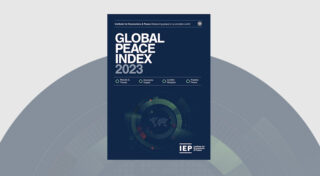In terms of the Positive Peace Index 2022, a comprehensive framework that provides a view of the factors that build and sustain peace, stability and socio-economic resilience in a given region or country, North Macedonia sits at number 56 globally. In both peace indices, the country’s ranking is above most other Balkan nations but below the European regional average.
The Ecological Threat Report 2022, however, deems North Macedonia’s ecological risk as ‘Extremely High’ with the country’s geography and climate rendering it vulnerable to natural disasters. Staying the course and reinforcing investments in peace, societal resilience and stability is therefore vital for North Macedonia to strengthen itself in the face of inevitable ecological adversity, and also, to advance its almost two-decades-long pursuit of integration into the European Union.
North Macedonia has a long and tumultuous history. Since its independence in September 1991 following the dissolution of Yugoslavia, the country has experienced considerable social, political and economic challenges on its journey to rebuild its national identity and reform its institutions. In more recent years, the country has grappled with a variety of tense relations both externally and internally.
North Macedonia was involved in a long-standing dispute with Greece over the country’s name “Macedonia”, which was resolved in 2019 with the Prespa Agreement when the country officially changed its name to the “Republic of North Macedonia”. This resolution opened the door for the country to pursue membership in international organisations such as NATO (joining in 2020) and the EU, to which candidate status was granted in 2005.
However, EU integration remains an aspiration not yet realised. While Greece removed its veto on North Macedonia’s accession following the resolution of the name dispute, its other neighbour Bulgaria maintains its blockade due to persisting disagreements about their shared history. France, too, blocked the country’s accession in 2019 based on concerns that the EU structure could not support further expansion to countries with insufficient political and economic stability. The Russia Ukraine conflict, however, has accelerated the growth of EU alliances and borders, with Finland (and soon Sweden) joining NATO, as well as Ukraine and Moldova being granted EU candidate status in June 2022. With these geopolitical shifts, France has since withdrawn its opposition to North Macedonia’s membership bid, and accession negotiations have begun.
Internally, the country’s social landscape has been marked by interethnic conflict between the Macedonian majority and Albanian minority populations. The years 2015-2017 saw a state of political and institutional turmoil where allegations of government corruption and abuse of power resulted in large-scale protests, violence and social unrest. The 2015 Przino Agreement attempted to resolve this political upheaval, leading to the resignation of Prime Minister Nikola Gruevski in 2016, a transitional government and amendments to electoral laws. Looking ahead, the country is working towards formulating a 20 year development strategy to build consensus between key political actors on the goals, priorities and development path of the nation.
North Macedonia’s economy has fluctuated over the years since independence in 1991, suffering notably during the 2008 global financial crisis and more recently, its 2015-2017 political crisis. Since then, the economy has shown signs of stabilisation with decreasing unemployment rates, more equal income distribution and increasing GDP growth. As of 2020, the country has one of the highest percentages of women engaged in research-related professions in Europe, a positive sign attributed to the country’s efforts in socio-economic gender empowerment. Despite these improvements, the economy continues to experience low productivity, high poverty rates and limited incentives for technological innovation, due to underdeveloped state institutions and a weak legal framework for business. Consequently, economic volatility and significant government spending on containing violence has hindered North Macedonia’s progress in peace indices.
The ETR 2022 predicts that North Macedonia and the rest of the Balkan region will have substantial water stress increases by 2040. Given the threat of natural disasters and susceptibility to future ecological crises, building societal resilience is key for the nation’s prosperity. International organisations such as the United Nations Development Programme (UNDP) have supported the country by providing technical expertise for better management of valuable natural resources, the impacts of climate change and disaster risk reduction. The UNDP and North Macedonia have collaboratively undertaken many environmental projects such as integrated watershed and river basins management, improving protected areas management, flood recovery and resilience-building through efforts like tackling air pollution in Skopje and supporting circular practices in various waste streams, including organic waste.
North Macedonia exemplifies the interconnectedness of political stability, economic growth and ecological sustainability. If persistent efforts are made in this regard, North Macedonia can continue as the guiding light for improving stability and security in the Balkan region.
Fostering peace in the country will form the ties that bind North Macedonia closer to European neighbours, strengthening its EU membership bid and global positioning. There is particular room for improvement in the ‘Low Levels of Corruption’, ‘Good Relations with Neighbours’ and ‘Sound Business Environment’ Positive Peace Pillars. Weaker scores here reflect the nation’s inner political turmoil, rocky international relations and economic challenges. Moreover, with looming ecological threats in and beyond its borders, further investment in securing sustainable peace and building societal resilience would be vital in the face of ecological crises and natural disasters.
The opinions expressed throughout this article are the opinions of the individual author and do not necessarily reflect the opinions of Vision of Humanity or the Institute for Economics & Peace.

Download the Global Peace Index 2023.
Global Peace Index 2023